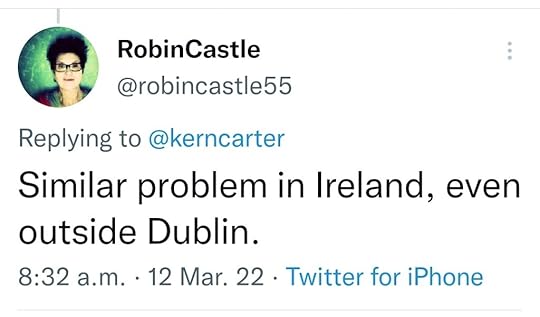Kern Carter's Blog, page 51
March 16, 2022
Rest for My Hero
March 15, 2022
I Held Sir Riley One Last Time In My Arms ~ As His Breathing Slowly Stopped . . .
March 14, 2022
Let Me Be Ugly
I am sobbing, trembling, shaking, hyperventilating into his embrace that holds me from across the world.
Come join us this evening
Hello my fellow superstars, we’re hosting a discussion this evening on Twitter Spaces and would be thrilled if you came out. The topic will be based on our latest newsletter, Why are so many editors leaving publishing?
The conversation around this topic is intensifying so we thought we’d gather to dive deeper into the problems plus explore some possible solutions.
Here is the link to join. We’ll be live at 6:00 PM EST.
[image error]Come join us this evening was originally published in CRY Magazine on Medium, where people are continuing the conversation by highlighting and responding to this story.
Labyrinth Talk
Woman: A Sub Mission?
 Image provided by Canva
Image provided by CanvaIt hurts the most when the violence is silent.
Can you see me?
The saline of my tears fills my gut,
because I have learned to swallow them.
I do not have an Adam’s apple,
this is a lump in my throat.
Why do you treat me as less than?
Is this truly what you believe?
Making myself smaller is how I am supposed to be seen?
Bleeding for a week straight and still sustaining society’s expectations.
Do you see the difference in the requirements for us when it comes to the practice of patience?
Birth,
on this earth.
Who else?
Puts their life on the shelf for nine months out of the year only to await the possibility of death and a day of unforgiving pain.
We bring human beings here.
A funnel of life,
despite.
The degradation we face.
Every
Single
Day.
Somehow, in some way.
To be the bearer of emotion and the wearer too…
Society proclaiming that you should not feel your feelings,
this guidance was never true.
Informing you of who you need to be,
how could anyone else tell that to you?
But they do.
Telling you what it feels like to be me,
in hopes that you will think of me when you are being you.
Respecting me for who I am,
requires your respect from you.
Can you see this?
Violence can be invisible and impact our virtue…
Viciously depleting the beauty in the differences of human beings.
Being a woman does not mean my journey is subpar.
Surrendering to the suffering is where we find our strength.
We are finite beings in an infinite existence,
we understand the inevitability
of pain.
The vitriol of violence will never silence,
her womb.
A woman’s mission,
is never subpar.
Woman: A Sub Mission? was originally published in CRY Magazine on Medium, where people are continuing the conversation by highlighting and responding to this story.
March 13, 2022
The Best and Worst of Displacement and The War On Ukraine.
At the end of the 19th century and around the bend to the next, Ukraine was unsafe. At that time, it was Jewish people who were the target…
Things Haven’t Changed That Much
At the end of the 19th century and around the bend to the next, Ukraine was unsafe. At that time, it was Jewish people who were the target…
March 12, 2022
Why are so many editors leaving publishing?
 Image by Krakenimages
Image by KrakenimagesWhen publishers maneuver through supply chain problems and navigate through a pandemic to keep up with the demand for books, they should be applauded. But when they’re failing to properly care for and nurture the people who make their businesses possible, publishers need to be called out just as enthusiastically.
When I read Molly McGhee’s impassioned post about leaving her job as Assistant Editor at a well known publishing house, it opened my eyes:
 Image from Tweet by Molly McGhee
Image from Tweet by Molly McGheeMolly has eight years of experience in the industry. The fact that she was told she wouldn’t be able to elevate out of an assistant position for another five years was something she wasn’t willing (and shouldn’t have been, in my opinion) to accept.
McGhee is just one example of what is not just a trend, but a systemic issue within publishing. Editors are overworked and underpaid. Much of the reading they’re tasked with happens outside of working hours, including on weekends, and done without any extra pay.
Assistant editors like Molly are also often tagged with managing administrative duties, duties that are time consuming and pull them away from their reading requirements. In Molly’s own words,
“[execs] cannot use their own databases, pull their own manuscripts, organize their own inboxes, or navigate the constant influx of new technology. As such, this often falls on junior employees, who are expected to perform both full time admin work in addition to their full time jobs.”Editors being overworked isn’t a new phenomenon
This 1998 New York Times article shows that this issue has been brewing for quite some time. With the number of titles surging through that decade, the number of publishing professionals in New York, mostly editors, were cut by 16%.
Editors were busy then and are busy now, acquiring new titles, assisting with marketing and promotion, keeping up with technology; all of this before getting down to their “primary” duty, which is to actually help authors construct their books and elevate the quality of the manuscripts before publishing.
But are editors actually even editing anymore? In Sadie Hoagland’s piece for Publisher’s Weekly titled, “The End Of Editing,” she tells the story of publishing her first book. After receiving suggestions from a peer review, she waited to hear what changes her editor would suggest.
“I agreed to address these small issues, and I waited for the editor to whom I had originally submitted the work to give me her edits. They never came. She told me to make the changes the reviewers had suggested, and then I was whisked right on to copy editing. I know she cared about the book. She just wasn’t going to edit it in the way I thought she would.”
Later in the article, Hoagland quotes her agent, Madison Smartt Bell, who says that, “Editors now can expect manuscripts submitted to them to be in an extremely finished state, perfected whether by writers teaching in the academy, or by agents drawing on their past experience as editors, or a combination of those two.”
The agent part is interesting. I can attest to how involved agents are in the editing process. My agent has been incredibly active, offering ideas and suggesting changes to my manuscript before we send to publishers. In fact, I’m an example of what is becoming more normal, which is I had my manuscript edited heavily before ever showing it to a publisher, so that when it was time for the publisher to edit my novel, there were no significant changes at all.
I didn’t know there was a time when editors from publishing houses wouldn’t expect fully polished manuscripts. I came into this game with the expectation that as an author, I would have to do most of the work myself. My first agent made me rework my entire manuscript, then pay to get it professionally edited before she agreed to pitch it to publishers. I remember several times her telling me that, “It wasn’t always like this.” Her words make more sense than ever.
This is not just a US problemA 2021 article by Clair Millar describes this exact issue in publishing in Australia. Millar opens the piece by stating, “For many people, working in the publishing industry is all they’ve ever wanted to do. But once they get there they face low wages, high workload and union busting — all while being told how lucky they are.”
And as I engaged with people on Twitter, it confirms the assertion that this is a systemic issue that plagues the entire publishing industry.
 So what do authors do?
So what do authors do?First thing we need to do is show some patience and empathy.

Yeah, editors are at full capacity, and with so many of them feeling like they’re forced to leave the industry, the burden on editors who have chosen to stay is even heavier. So maybe don’t be so critical if you get a rejection without any explanation.
The next thing authors should do is take more accountability. Like it or not, this is the situation we’re in. Despite how much an editor may care about your book, they may not have the capacity or energy to give you the type of content or line edit your story needs. That means the onus is on you. Bring them a polished manuscript. It sucks that you might have to pay more upfront to make sure your manuscript is properly edited, but think of it as an investment.
Let me take a quick step back. In no way am I saying editors are not capable of doing their jobs. They are creative people just like us writers and they wouldn’t be in this industry if they didn’t love books and reading books, specifically. What I’m saying is that the economics of their situation, the amount of work they need to keep up with on a daily basis, is making it more difficult for them to do the thing which I’m certain they love most, and that’s editing books.
So with that in mind, we as authors need to understand the landscape. And while I agree that we should push the publishing industry to do better, the reality is what it is. And we need to deal with the current reality of the situation so we can make better decisions for ourselves and for our careers.
[image error]Why are so many editors leaving publishing? was originally published in CRY Magazine on Medium, where people are continuing the conversation by highlighting and responding to this story.









